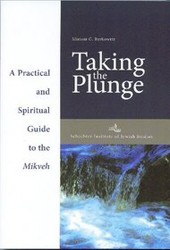This short story collection by Jay Michaelson is, as its title suggests, a book of opposites: characters are “here and not here,” seeking desire amid revulsion; revealing themselves as they conceal themselves; and discovering that the profane is in fact the sacred, and the sacred, the profane.
Drawing on kabbalistic ideas, Michaelson explores these seeming contradictions as he creates an expansive vision of Jewish life. The family in “The Acacia Tree” is modern religious. In “The Night Watchman and the Hundred Thousand Golems,” the protagonist hails from a line of secular Jews and finds solace in the orderliness of the laws governing Jewish mysticism. Other characters make aliyah, visit the mikvah, and embark on spiritual journeys. Taken together, these experiences demonstrate that spirituality is a porous pursuit, not bound to any one sect of Judaism.
Michaelson also touches on the breadth of the queer Jewish experience. In “The Secrets of Nakedness” — one of the most captivating, dialogue-rich stories — a gay man named Nathan attends a meditation class with a progressive rabbi, hoping that she’ll help him curb the fantasies he has about other men during sex with his partner. While in class, Nathan speaks with a laconic Israeli psychologist who eventually leads him back to his apartment, where they’ll get to the root of Nathan’s fantasies. An earlier story, entitled “The Verse,” describes how a number of characters respond when Leviticus 18:22, which is “generally understood as the biblical injunction against homosexuality,” disappears from every Torah in existence. These and other stories honor characters as they explore the relationship between their queerness and Jewishness.
As is the way with much of Jewish storytelling, not all of Michaelson’s stories end in perfect resolution. In “The Acacia Tree,” a wrong step leaves an Israeli teen stranded in the desert, dehydrated and hallucinating. In “The Ascent of Chana Rivka Kornfeld,” the shortest and most fast-paced story, a man’s rageful behavior and extremist ideas end up costing the narrator her life. Chana’s final thoughts are as poetic as they are tragic: “ … and with that I am enveloped in this or ganuz, this radiant and undying light, and I am dissolved into it, and I am no longer in that place but here in this one … and I am open and dissolved and here.”
Like any story collection, some of the stories are more affecting than others. A few of the narrating voices are quite similar to one another, and Michaelson’s ample use of footnotes runs the risk of pulling readers out of the story world. Nevertheless, The Secret That Is Not a Secret is a compassionate, wide-ranging meditation on desire and religion. Michaelson writes with honesty, with heresy — and that is no secret.
Kyra Lisse is a writer and editor from the Philadelphia area. Her work has been published in or is forthcoming from Ghost City Review, Sky Island Journal, SWWIM, New Voices, and Assay: A Journal of Nonfiction Studies, among other places. Kyra currently lives in Lancaster, PA.



